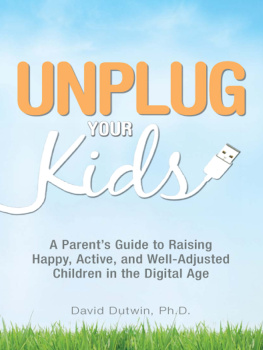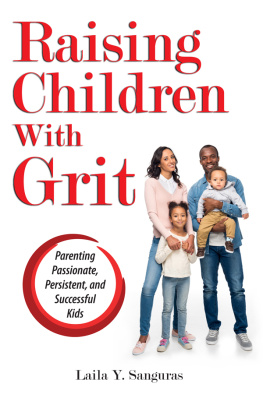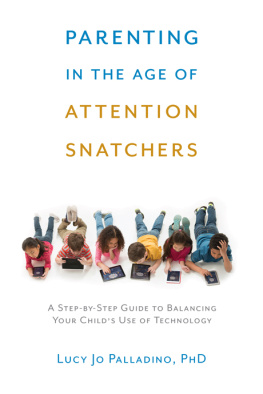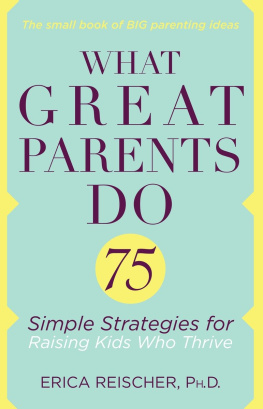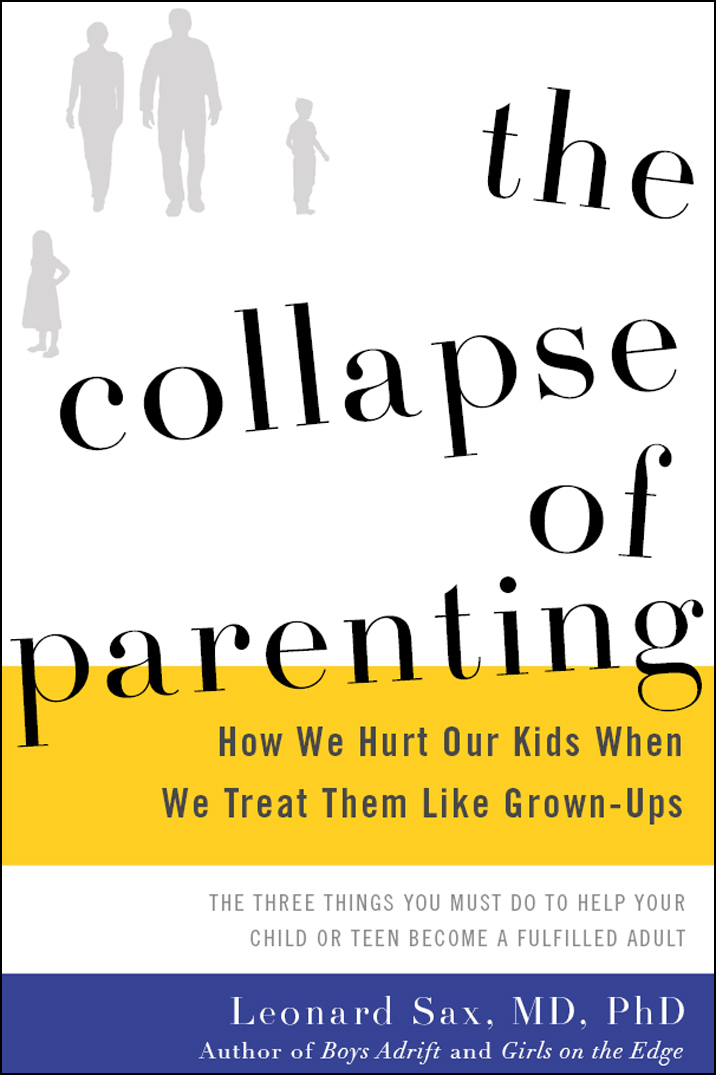Advance Praise for Leonard Saxs
The Collapse of Parenting
Dr. Leonard Saxs The Collapse of Parenting should be required reading for all parents when they enroll their child in preschool. Based on years of extensive clinical practice and interviews with students and parents internationally, Sax presents a sobering and alarming picture of the collapse of parenting in this country. But he does not leave the reader without hope; he offers simple, if not easy solutions, giving parents an accessible guide to help them regain their rightful roles.
DR. NANCY KEHOE, AUTHOR OFWRESTLING WITH OUR INNER ANGELS: FAITH, MENTAL ILLNESS AND THE JOURNEY TO WHOLENESS
It is time for us to get real as a society. Dr. Leonard Sax has issued both a warning and an encouragement for parents to take up their proper roles in leading their children to a truly mature adulthood. His book is a highly readable and well-informed challenge for us.
DR. TIMOTHY WRIGHT, HEADMASTER AT SHORE SCHOOL, SYDNEY, AUSTRALIA
There are many holy trinities, but in educational terms, one of them is definitely the relationship between parents, children, and schools. I certainly will be recommending this book to the parents of my school. It does not preach; it cajoles, encourages, guides and helps. It allows one to stand back and step back on one of the most important aspects of lifelooking after our youngsters.
ANDREW HUNTER, HEADMASTER OF MERCHISTON CASTLE SCHOOL, EDINBURGH, SCOTLAND
The Collapse of Parenting
Also by Leonard Sax:
Girls on the Edge
Boys Adrift
Why Gender Matters

Copyright 2016 by Leonard Sax
Published by Basic Books,
A Member of the Perseus Books Group
All rights reserved. Printed in the United States of America. No part of this book may be reproduced in any manner whatsoever without written permission except in the case of brief quotations embodied in critical articles and reviews. For information, contact Basic Books, 250 West 57th Street, New York, NY 10107.
Books published by Basic Books are available at special discounts for bulk purchases in the United States by corporations, institutions, and other organizations. For more information, please contact the Special Markets Department at the Perseus Books Group, 2300 Chestnut Street, Suite 200, Philadelphia, PA 19103, or call (800) 810-4145, ext. 5000, or e-mail .
Book design by Cynthia Young
Library of Congress Cataloging-in-Publication data.
Sax, Leonard.
The collapse of parenting: how we hurt our kids when we treat them like grown-ups / Leonard Sax.
Description: New York: Basic Books, 2015
Includes bibliographical references and index.
Identifiers: LCCN 2015036659 |
ISBN 978-0-465-07384-9 (e-book)
Subjects: Parenting. | Parent and child. | Children and adults.
LCC HQ755.8.S298 2015 | DDC 306.874dc23
LC record available at http://lccn.loc.gov/2015036659
10 9 8 7 6 5 4 3 2 1
Dedicated to my wife, Katie,
and my daughter, Sarah
Table of Contents
Guide
Contents
I knew what I wanted to say. But I didnt say it.
Al and Mary McMaster have two daughters, Tara and Margo. Mom brought 14-year-old Tara in to see me. Mom was concerned about an irritated rash at both corners of Taras mouth. Ive tried some over-the-counter creams, but nothing has worked, mom said. What do you think it is?
All names have been changed, except where noted.
After examining the rash, I answered, This rash sometimes can be a sign of vitamin deficiency. I see this rash frequently in people who arent eating cruciferous vegetables, such as broccoli, Brussels sprouts, cabbage, and cauliflower, or green leafy vegetables such as spinach and kale. How good is Tara at eating those vegetables?
Tara snorted. Mom sighed. Her father and I eat very healthy, mom said. But Tara refuses to eat most vegetables. To be honest, right now pretty much the only things she will eat are French fries
McDonalds French fries, Tara interrupted.
McDonalds French fries, pizza, chicken nuggets, and potato chips, mom finished. Thats pretty much it right now, except for frozen desserts like Italian ices and ice cream.
How about broccoli or cauliflower? Or spinach? I asked.
She just wont eat those things, Mary said.
She would if she were hungry enough, I thought to myself. But I didnt say it.
J im and Tammy Bardus have one child, Kimberly, 8 years old. After carefully researching the local public schools, Jim and Tammy were concerned about what they considered an overemphasis on basic skills, such as reading and writing, and the elimination of what the public schools now call enrichment programs, art and music in particular. Those programs had been cut because of shortfalls in the districts budget. So Jim and Tammy decided to enroll Kimberly in a private school, even though it wouldnt be easy for them financially.
Tammy took Kimberly to visit four different schools. Tammy and Jim both liked school X: the atmosphere was warm and nurturing, the teachers were enthusiastic, and the long-term outcomes of the students were well documented. But Kimberly liked school Y. On her visit to school Y, Kimberly had clicked with the student escort, a 9-year-old named Madison. Madison and Kimberly discovered that they both liked the Ramona and Beezus books by Beverly Cleary, and they both liked American Girl dolls. But the parents were concerned about the dilapidated condition of the school, the lack of enthusiasm on the part of the teachers and administrators, and the schools refusal to disclose where graduates of the school (a K8 school) went to high school. Tammy and Jim advised their daughter to attend school X. But Kimberly insisted on school Y. And thats the school where she is now enrolled.
When I asked Tammy why she and her husband allowed their 8-year-old daughter to have the final say, Tammy answered, I think good parenting means letting kids decide. Thats how kids learn, right? If I make all the decisions for her, how will she ever learn to decide on her own? And if I force her to go to a school that wasnt her first choice, what can I say if she complains about the school later?
Forty years ago, most parents who sent their kids to private schools didnt ask their child which school the child preferred. Forty years ago, the parents made that decision, often overruling their childs preference. Even 30 years ago, when I graduated from medical school, it would have been unusual for parents to let an 8-year-old have the final say in the choice of school. Today it is common.
Im not suggesting that the 1970s or the 1980s were better than our own era. Every era has its shortcomings. But I dont think we are facing up to ours.
My friend Janet Phillips and her late husband, Bill Phillips, (their true names) raised four sons. When the boys were in high school, Janet and Bill became concerned about stories they were hearing about kids drinking. Then they saw it for themselves: high school kids who were clearly drunk but who were nevertheless getting behind the wheel of a car. What to do?
Bill bought a Breathalyzer. The next time there was a party at their house, Bill saw a boy who appeared to be drunk. Bill told the boy, Come with me. He handed the boy the Breathalyzer and told him to blow into the device. Sure enough, the boy was drunk. Janet called the boys parents and asked them to take their intoxicated son home. To the surprise of both Bill and Janet, the boys parents were offended by the phone call. The boys mother did take her son home, without a word of thanks to either Janet or Bill.



